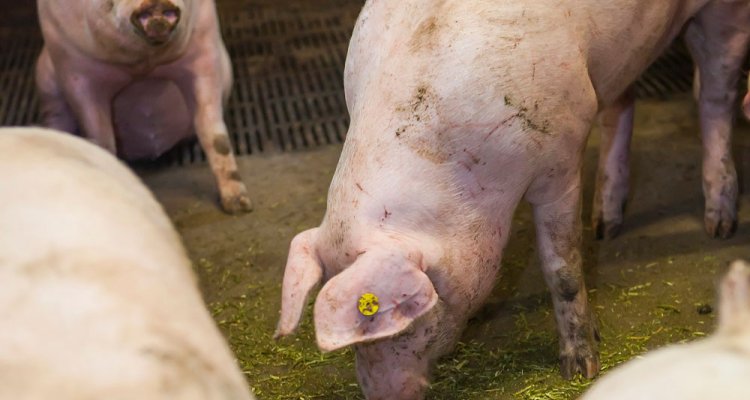
Aujeszky's disease
Aujeszky's disease is an extremely infectious viral disease in pigs. The virus is transmitted primarily via direct contact, but indirect contact and transmission via the air can also play a role. Other mammals can become infected, but humans are not susceptible. Wageningen Bioveterinary Research carries out research into this disease.
Aujeszky's disease can cause great economic damage to the pig sector. Pigs, including wild boar, are far-and-away the most important hosts for the virus.
Virtually all other mammals can become infected, such as cattle, sheep, dogs and cats. These other animal species are in fact always infected by direct or indirect contact with pigs, after which the disease is almost inevitably fatal. There is no known treatment. One or two cases of horses that became infected at some point have been reported, but in general horses are regarded as practically non-susceptible. Humans and hominids (great apes) are not susceptible at all to the virus.
The Netherlands has been officially free of the disease since 2009. Preventing and eradicating Aujeszky's disease is a task carried out by the Dutch government. Wageningen Bioveterinary Research provides support to the authorities in the execution of this work.
Aujeszky’s disease infection
Spread of Aujeszky’s disease
The virus is transmitted primarily via direct contact between pigs, but indirect contact and even transmission via the air also play a role. The virus can remain infectious in the local environment for several hours up to days. Infection occurs primarily via the respiratory passages and ingestion via the mouth. Infected animals can become latent carriers of the virus. Under certain circumstances, often associated with a reduction in immune response, the virus may reactivate and the animal may become infectious again. It has never become clear how big a role carriers of this sort play.
Other species become infected via direct or indirect contact with pigs. Consuming the meat or organs of infected pigs can lead to infection among carnivores. Owing to the eradication of Aujeszky's disease across large parts of Europe, this currently still occurs primarily in hunting dogs that come into contact with infected wild boar (mainly through eating offal). These other species are usually dead before they are able themselves to infect other animals and are as a result so-called "dead-end hosts". For this reason, virus transmission between hosts other than the pigs amongst each other is extremely rare.
Although the virus still occurs widely in wild boar in most countries that are free of Aujeszky's disease, only a few cases are described of infections in domestic pigs caused by virus originating with wild boar. So, the threat to domestic pigs arising from infected wild boar appears to be extremely limited.
Is the disease still present in the Netherlands?
The Netherlands began eradicating the disease in around 1980. An effective vaccine is available, and the Netherlands has officially been free of this disease since 2009. The Dutch pig sector remains alert to any signs, and a monitoring programme for pigs and wild boar is in operation. This is important, because Aujeszky's disease is certainly still active in Europe. Minor outbreaks have occurred in Germany and France over recent years, and the virus has been found in wild boar populations in Belgium, Germany and elsewhere. Very recently, in 2019, a few pig farms in Southern France were affected. Luckily, it was possible to contain these outbreaks rapidly.
Where in the world does Aujesky’s disease occur?
Aujeszky's disease occurs across large parts of the world. Various European countries are disease-free. In many European countries, the disease has been eradicated in domestic pigs, while the virus occurs widely in wild boar. In recent years, there were small outbreaks in Germany and France, and the virus was found in wild boar populations in Belgium and Germany, among other countries.
Canada and New Zeeland are disease-free. The United States of America has also been free of the disease since recently, but it is still present in the wild boar population.
Prevention and control of Aujeszky's disease
The Netherlands began eradicating the disease in the 1980s. Various phases were undergone in sequence:
- Ban on the use of conventional vaccines (only marker vaccines allowed).
- Mandatory vaccination programme with a marker vaccine for all pig farms.
- Voluntary certification programme for farms that were free of Aujeszky's disease.
- Mandatory participation in the certification programme.
- Mandatory participation in a surveillance programme for all farms.
- Shift from compulsory vaccination to a ban on vaccination.
This resulted in the official status "Free of Aujeszky" within the EU on 1 January 2009.